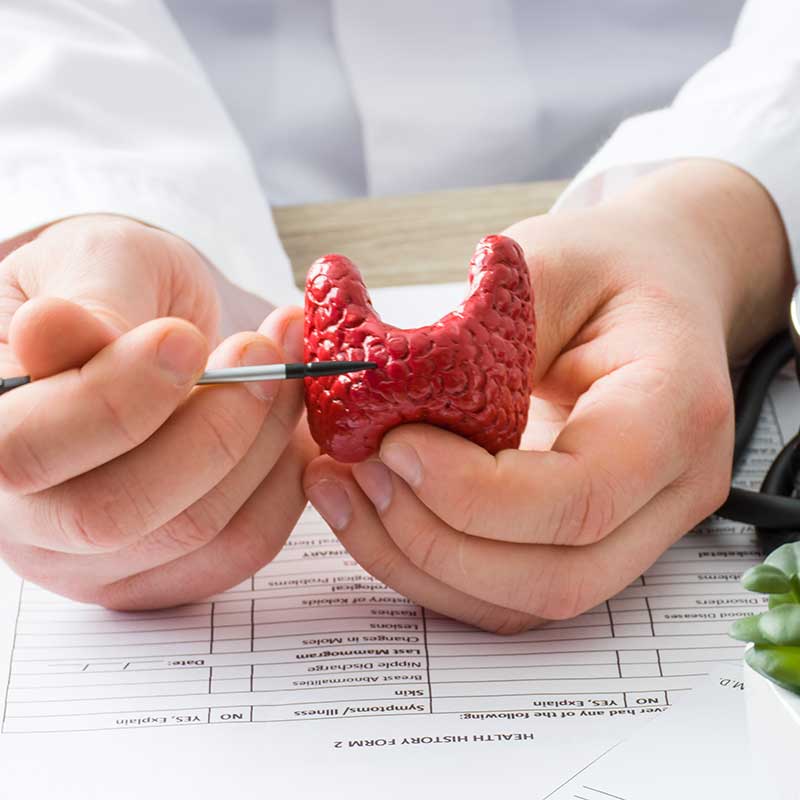
Thyroid Doctors in Casper, WY
Thyroid problems have become one of the health-problem-rock-star-darlings of the internet. Everyone seems to want to sell you a product that will magically solve symptoms traditionally attributed to a haywire thyroid. Without a proper diagnosis of the core problem, however, these remedies can do more harm than good. When it comes to potential thyroid malfunction symptoms, visit Wyoming Otolaryngology for a complete exam and diagnosis followed by the appropriate treatment.
How do I Know If I Have a Thyroid Problem?
Your thyroid is a butterfly-shaped gland in your neck, located just in front of your trachea, spreading its lumpy little wings out just below your voice box. As part of your endocrine system, it processes the iodine from food into hormones, particularly T3 (triiodothyronine) and T4 (Total thyroxine). Among other things, these hormones help govern your metabolism by synthesizing protein and boosting your cells’ ability to consume oxygen. Troubling symptoms develop when the thyroid misbehaves. While it seems that women hitting middle age are most likely to experience some of the following symptoms, men and children can also suffer thyroid troubles.
Can’t sleep? Can’t wake up in the morning? Can’t lose those annoying extra pounds no matter how much you diet and exercise? Does your mind feel lost in a fog? Too hot? Are you always feeling too cold? Maybe it’s your thyroid…
Symptoms of Hypothyroidism
A diagnosis of hypothyroidism means that your thyroid is slacking off on thyroid hormone production to the point where you may struggle with symptoms like:
- Fatigue
- Stubborn weight gain
- Heightened sensitivity to cold
- Hair loss
- Mental fog/memory loss
- Facial swelling
- Irregular menstrual cycles
- Joint pain and stiffness
- Dry skin, brittle nails
- Constipation
- Depression
- Enlarged thyroid gland (goiter), including trouble swallowing
Hypothyroid problems in babies can also be dangerously problematic and should be taken very seriously, as they can lead to unsettling growth and development problems. In fact, some babies are born without a thyroid. Symptoms of hypothyroidism in babies include:
- Jaundice (abnormally yellow skin and whites of the eyes)
- Frequent choking spells
- Swollen face and/or tongue, making it hard to breathe
- Constipation
- Poor muscle tone development
- Lack of energy/too sleepy
- Trouble eating, difficulty gaining weight
Symptoms of Hyperthyroidism
Like hypothyroidism, hyperthyroidism causes a long list of potential symptoms that can be a challenge to pin down. On the flip side, however, hyperthyroidism is when your thyroid goes into overdrive and produces far too much in the way of thyroid hormones, resulting in a different set of vexing symptoms:
- Unexplained weight loss (even if your diet and activity levels haven’t changed)
- Increase in appetite
- Difficulty sleeping, restlessness
- Irregular heartbeat (arrhythmia), rapid heartbeat (tachycardia), and obvious palpitations.
- Red or flushed face
- Heightened anxiety, nervousness, easily irritated
- Increase in perspiration
- Tremors in the hands
- Muscle fatigue
- Increased heat sensitivity
- Overly frequent bowel movements
- Irregular menstrual periods
- Goiter (the thyroid gland is enlarged), leading to a lump in the neck and pain when swallowing, or even breathing.
- Graves’ ophthalmopathy (swollen eyes, excess tears, pressure, pain, light sensitivity, double vision)
What Autoimmune Diseases and Disorders Affect the Thyroid?
If you’re suffering from an autoimmune disease, it may start attacking your thyroid. For example, hypothyroidism symptoms are often connected to a thyroid inflamed by Hashimoto’s disease. Graves’s disease is the most common culprit behind an overactive thyroid.
In the case of Hashimoto’s disease, or a sluggish thyroid, the treatment goal is to restore normal levels of thyroid hormones through replacement therapy with synthetic thyroid pharmaceuticals.
Thyroid Treatments
Hypothyroidism is often treated with synthetic hormones to help boost thyroid function. When we prescribe synthetic hormones, we need to monitor it carefully and make adjustments to your dose to make sure it’s working correctly.
When it comes to an overactive thyroid gland, treatment may include radioactive iodine treatment, thyroid hormone blockers to reduce the effects of excess thyroid hormones on the body, and beta-blockers. When medications fail to do the trick, surgery to remove all or part of the thyroid may be necessary, as well as life-long thyroid hormone replacement therapy thereafter.
What Are the Early Symptoms of Thyroid Cancer?
Unfortunately, thyroid cancer is on the rise around the world. Fortunately, however, treatment prognosis is usually good if it is caught and treated early enough. Symptoms include:
- A persistent sore throat, cough or hoarseness not due to a cold
- A fast-growing lump in the throat in the area of the thyroid
- Trouble swallowing or breathing
Contact Wyoming Otolaryngology right away if you have these symptoms. We can perform an ultrasound that can detect any nodes on the thyroid. A follow-up biopsy can determine whether the nodes are benign, intermediate, or malignant so that appropriate treatment can be administered.

